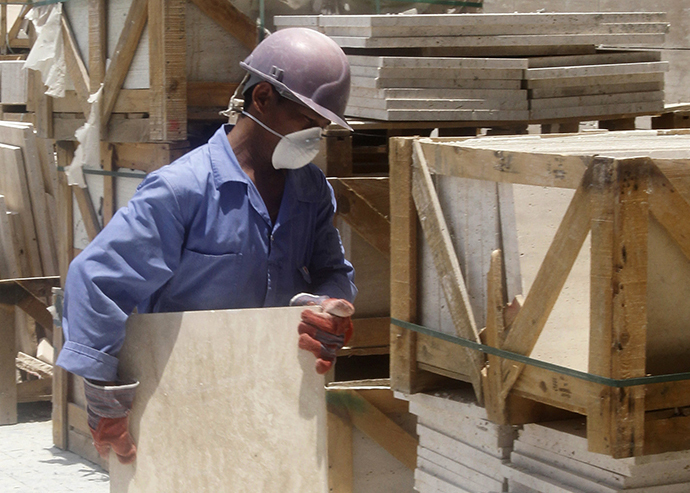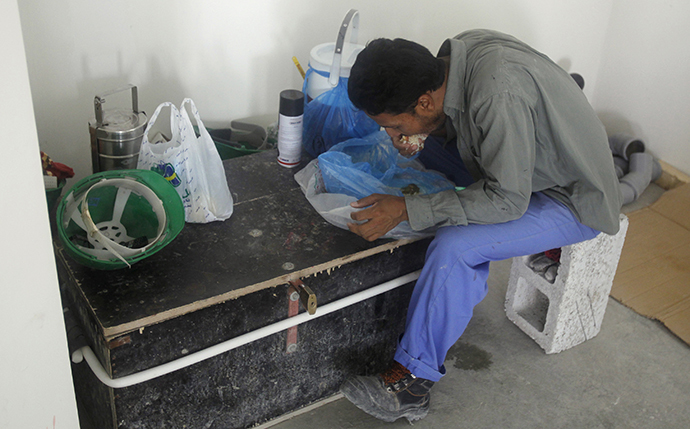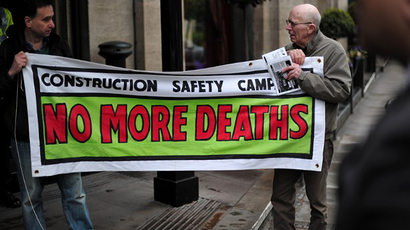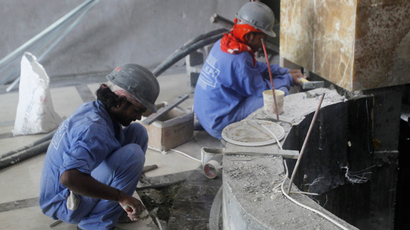German filmmaker imprisoned for exposing dire Qatar World Cup worker conditions
Toiling in terrible conditions, no salaries for months, passports confiscated by employers – that’s the horrendous reality for migrant workers helping with preparations for the World Cup 2022 in Qatar, as revealed by German filmmaker, Peter Giesel.
He and his cameraman were
detained and imprisoned after they tried to investigate the
story. The two went to Qatar following the publication of a
report in the Guardian, claiming that workers are enduring
appalling labor abuses.
Giesel said that they were arrested in their hotel rooms on October 3 and taken to police headquarters. There, all their equipment was impounded, and police then took the filmmakers to the State Security prison in the suburbs of Doha.
RT exclusively interviewed filmmaker Peter Giesel to find out about their experiences, and what they witnessed while covering the issue in Doha.
“We were there, in those separate cells, in [sic] the total of
21 hours. We were treated quite well, we got good food, to be
honest, but the bad thing about those 21 hours was that we
weren’t allowed a single phone call: not to our embassy, not to
our families, no one was there to tell us what the charge was
really, so we were kind of desperate in there, not having any
contact with the outside world,” Giesel stressed.

Prior to their confinement, he and his cameraman met with migrant workers who told them about their plight.
One of the men interviewed worked for 12 years as an accommodation specialist, but, as Giesel indicated to RT, “ironically, his accommodation itself doesn’t even have a fan.”
The man hasn’t been getting his salary and bonuses for a number of years, and his main difficulty is to fight a case against his boss and his firm: the employer took his passport from him, and the 35-year-old worker hasn’t made the money necessary to return home, “the devilish circle”, as Peter Giesel put it to RT.
Another group of guys – there were four of them – weren’t paid
for seven months in a row and were trying to file a case when
Giesel met them.
As the filmmaker explained, one of the main issues surrounding migrant workers is that they are employed under the so-called kafala system, which is “a law basically stating that every migrant worker that comes into Qatar has to find his own personal sponsor meaning his boss, the firm or corporation he’s working for.”
“And that sponsor has to take care of him legally and medically, but obviously, most of the sponsors take their passports away from the migrant workers. That puts maybe tens of thousands of them in a miserable situation. They can’t make any money to go home, so they’re trapped down there.”
Moreover, migrant employees can’t rely on outside forces such as their countries’ embassies, according to Giesel.
“I had a chance to sneak into the Nepalese embassy and do my recordings down there. It seems to be some kind of chaos: the bureaucracy not only in the embassies, but also in the Qatari system might be too overwhelming for those 1.4 million migrant workers to be treated fairly,” he told RT.

Despite the disastrous situation, Giesel is certain that the World Cup in Doha won’t be canceled, as “there’s just too much money involved in it. There are sponsorships, contracts ready, most of them signed already, there’s big political money, there’s big infrastructural money. Right now, there are billions spent down there in Doha to put up the streets, to put up new shopping malls, to put up new stadiums indeed.”
The FIFA President, responding to the outrage, said that he would speak with the country’s emir about the situation, but “we can’t be the ones who change it.”
Giesel said that they were detained in their hotel rooms on October 3 and taken to police headquarters. There, all their equipment was taken from them, and police then took the filmmakers to the State Security prison in the suburbs of Doha.
Finally, when asked why migrants continue to come to Qatar despite the difficulties, Giesel simply said that they “make more money out there.”
“Although the salaries average an estimated $350 a month, even
for specialist workers, it’s more than in their home countries:
Nepal, Bangladesh…” Giesel told RT.














